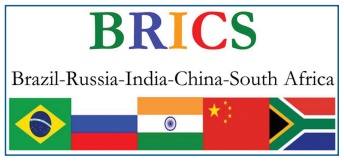International Economic Organisations - BRICS | 12th Economics : Chapter 8 : International Economic Organisations
Chapter: 12th Economics : Chapter 8 : International Economic Organisations
BRICS
BRICS
BRICS is the acronym for an association of five major emerging
national economies: Brazil, Russia, India, China and South Africa.
Originally the first four were grouped as "BRIC" before the
induction of South Africa in 2010. The term ‘BRIC’ was coined in 2001. The
BRICS members are known for their significant influence on regional affairs.
Since 2009, the BRICS nations have met annually at formal summits. South Africa
hosted the 10th BRICS summit in July 2018. The agenda for BRICS summit 2018
includes Inclusive growth, Trade issues, Global governance, Shared Prosperity,
International peace and security.

It’s headquarters is at Shanghai, China. The New
Development Bank (NDB) formerly referred to as the BRICS Development
Bank was established by BRICS States. The first BRICS summit was held at Moscow
and South Africa hosted the Tenth Conference at Johanesberg in July 2018. India
had an opportunity of hosting fourth and Eighth summits in 2012 and 2016
respectively.
Few Facts About The BRICS
® The BRICS countries
make up 21 percent of global GDP. They have increased their share of global GDP
threefold in the past 15 years.
® The BRICS are home to
43 percent of the world's population.
® The BRICS countries
have combined foreign reserves of an estimated $4.4 trillion
1. Objectives of BRICS
1. To increase trade co-operation by making an exclusive trade
block.
2. To use currency other than US Dollar. Since Dollar is a
dominant currency and US can control the flow of dollar, BRICS helps in the
countries operating with alternative currencies. How far have they succeeded in
this respect? Not much.
3. To increase regional co-operation.
4. To create a separate trade block made for developing countries
for trade co-operation.
2. Functions of BRICS
1. It acts as a promoter of more legitimate international system
and also advocating reform of the UN Security Council.
2. This group of nations is especially meant for South-South
framework for cooperation.
3. It performs as an agent to bridge the increasing gap between
developed and developing countries. For instance, in the WTO, the BRICS
countries are emphasizing to promote a fair order regarding agricultural
policies.
4. It performs a commendable contribution for assisting developing
countries in gaining in areas such as an advantage in trade and climate change
negotiations.
5. It disseminates information and exchange platform beyond
economic cooperation.
6. It acts as a catalytic in protecting the interests of middle
powers on global forum.
3. Achievements of BRICS
Following are some of the major achievements of BRICS.
·
The establishment of the Contingent Reserve Arrangement (CRA) has
further deepened and consolidated the partnership of its members in the
economic-financial area.
·
In the sixth BRICS summit in Brazil, the member countries, signed
an agreement to create a development bank (New Development Bank) with
headquarters at Shangai, China in 2015 on the lines of Asian Development Bank
and the World Bank.
·
The economic potential and demographic development are putting the
BRICS countries, increasingly in a leading position in setting the global
agenda and having a greater say in the global governance.
It has to be remembered that BRICS share 43% of world population,
but only 21% of the global GDP.
Related Topics